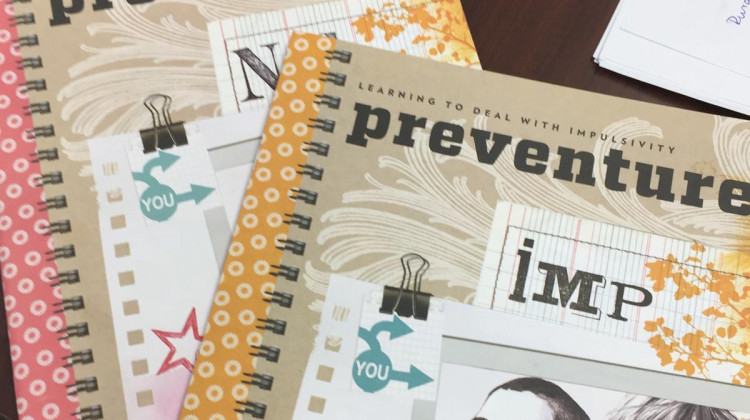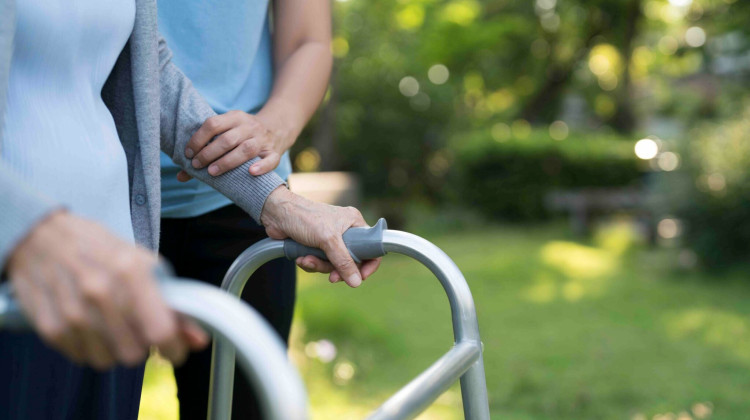Prevention is an important piece of the addiction crisis puzzle. A new substance abuse prevention program in Indiana aims to address the risk of addiction through personality assessment. The goal is to give young people the tools to strengthen their mental wellness and resilience.
Aaron Phillips died from a drug overdose when he was 20. His mom, Justin Phillips has dedicated her life to preventing others from the same fate.
She remembers his personality traits.
"He was so sensitive," says Phillips. "This was a kid that skateboarded off the roof onto the van in the driveway, so I think there was some risk-taking there too."
Sensitivity, impulsivity and anxiety are some of the personalities targeted by a new prevention education program that Phillips introduced through her nonprofit Overdose Lifeline. Phillips says the goal is to arm students with tools.
"No one ever talks to anyone about anxiety and we never talk about how to deal, cope appropriately with anxiety," says Phillips.
Overdose Lifeline has presented the program to 13 schools in six low income Indiana counties. It’s called Preventure.
"Changing the way that we think, so recognizing first of all that you have impulsivity, and what it looks like, what it feels like, what the thoughts might be around that personality," says Phillips.
The Indiana Division of Mental Health and Addictions supported the launch of Preventure through a grant and pilot project. Students are identified through a screening and then can participate in two 90 minute workshops. Families can opt out.
Savi Brenneke is one of the program facilitators with Overdose Lifeline.
"We’re teaching them that you do have control of your thoughts," says Brenneke. "You don’t have to be a product of the event happening, rather your thoughts are malleable. You can change the way you’re thinking to ultimately change your behavior."
Research shows the younger a person starts using drugs the more likely they could become addicted. There’s still limited study about the Preventure program approach. This is the first time it's being used in the U.S.
Brenneke says the Indiana pilot will add data.
"Compare the students that enroll in the program and their substance use and overall mental quality with the rest of the student population who doesn’t participate. It’s not just about substance use it’s about overall mental health," says Brenneke.
But it can be a hard sell. Pat McLaughlin is the principal at Eastbrook High School in Grant County. He says they initially had some pushback.
"Because it’s talking about addiction prevention and just the negative connotation that parents might have that, 'oh my kids wouldn’t do that,'" says McLaughlin.
All of his ninth graders were screened through the program and none of the students opted out.
There’s a growing awareness of the importance of social and emotional learning. McLaughlin says his students need support.
"They’re talking about their home life, not having running water at home or heat," says McLaughlin. "And then trying to come to school and we’re trying to educate them with all of those things they brought with them."
Root causes like poverty and other adverse childhood experiences that can contribute to the risk of substance use disorder.
Jackie Crane is a school nurse, she helped bring the Preventure program to Seymour High School.
"If there is any sort of trauma in a child’s life, then if they’re not given the right tools they’re going to go down this path," says Crane.
Crane’s son has struggled with heroin addiction. She says she gets it, why young people start using.
"Because you’re in a bad mood, you’re so anxious, nobody is listening to you, and you feel like you don’t have a voice, so you need something to calm you down," says Crane.
Crane says her son would have benefitted from the mental health tools provided through this school program, before years of addiction, arrests and now recovery.
"Taylor is 27 and he is just now learning coping skills from the programs he’s been in now," says Crane.
Overdose Lifeline hopes train more school districts to implement the Preventure program.
 DONATE
DONATE








 Support WFYI. We can't do it without you.
Support WFYI. We can't do it without you.